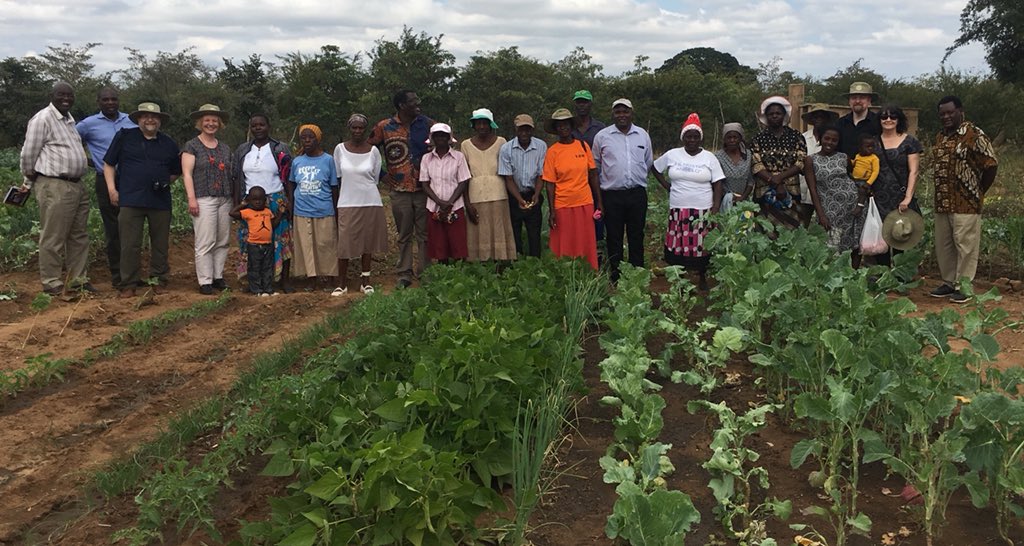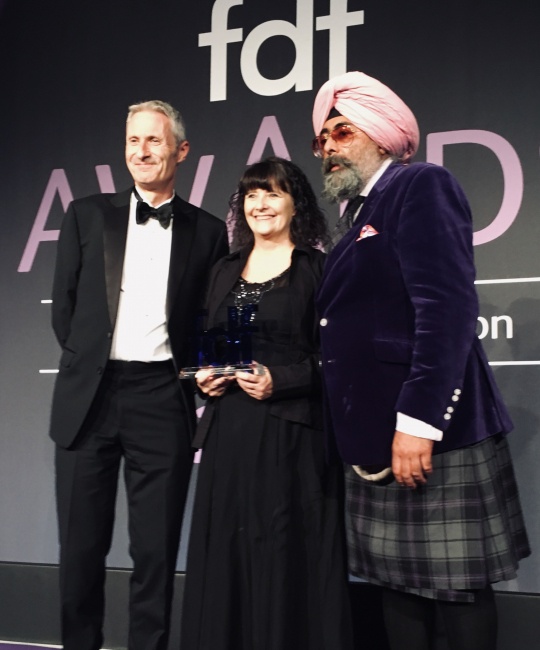
BSc (Hons), PhD, CSci, CChem, MRSC
Personal Chair
- About
-
- Email Address
- w.russell@abdn.ac.uk
- Telephone Number
- +44 (0)1224 438777
- Office Address
Rowett Institute (Room 4.004)
Forresterhill Campus
Aberdeen
AB25 2ZD
- School/Department
- School of Medicine, Medical Sciences and Nutrition
Biography
Having always had an interest in the bioactive compounds found in plants (phytochemicals), I studied chemistry at the University of Bristol (1992-1994), followed by a PhD in natural product chemistry (1994-1997). This led to research on how phytochemicals impact on disease and I now investigate the complex relationship between diet and human health. My current research aims to establish the metabolic phenotypes defining population groups and with a strong focus on the functional role of the gut microbiota, the effect of dietary change on disorders such as cardiovascular disease, type 2 diabetes and cancer. However, as several challenges impact of our food supply system, my research contributes towards ensuring that our food system is resilient. This includes topics such as maintaining biodiversity, protein provision for the future, revalorisation of food waste and emerging technologies in crop breeding and food formulation. This involves working across a wide range of stakeholders, leadership of food groups in the learned societies and collaboration with industry by chairing International Life Science Institute expert groups, as well as working directly with individual and local companies to help with product development. This requires a truly transdisciplinary approach and with initiatives such as the Leverhulme artists-in-residence scheme, I have explored new ways of working to bring food science to the general public. Through Scottish Government-funded research within SEFARI, we are addressing some of the challenges faced by the Scottish Food and Drink Industry to be able to provide affordable, acceptable and nutritious food by sustainable practices. This collaborative and joined up approach is essential as we move forward to tackle global issues and I also have active research funding to contribute to global food security, exploring high value crops that can be grown in countries such as Malawi and Zimbabwe (see 'Research' tab for further details).
External Memberships
Chair of the ILSI Expert Group ‘Efficacy of intervention in metabolic syndrome’
Objectives of this project are to better understand the role of diet on the defining criteria of metabolic syndrome (i.e. low HDL-cholesterol, high blood pressure, hyperglycemia/insulin resistance, hypertriglyceridaemia and adiposity) and their impact on the risk of cardio-metabolic diseases. This expert group aims to establish an efficacy model for food interventions so that the overall benefits of dietary change can be assessed.
https://ilsi.eu/task-forces/nutrition/obesity-and-diabetes/
Convener and Trustee of the Board 'AAB Food Systems Group'
Application of biology is integral to the processes and infrastructure involved in feeding our population. As several challenges impact of our food supply system, we have to ensure that it is secure and resilient. This requires a truly transdisciplinary approach across the sciences both on a national and global level. The biological sciences will play a major role, but this will require a strategic and collaborative approach and possibly new and as yet undiscovered ways of working. Within the Food Systems Group, we hope to identify the role in which applied biology underpins our food system and also what can be contributed at an international level. We aim to work with stakeholders across the food supply chain involved in all aspects of food production and to provide a forum for debate and advancement of knowledge of this important scientific topic.
https://www.aab.org.uk/food-systems
Committee Member 'RSC Food Group'
The aims of the group are to promote the role of chemistry in food and enable transfer and sharing of information and networking between academia and the food industry. This includes analytical, biochemical, chemical, physical, nutritional and toxicological aspects of food and food ingredients and the composition and relationships between structure and functionality throughout the entire food chain in a way to enhance sustainability and food and nutrition security.

https://www.rsc.org/Membership/Networking/InterestGroups/Food/index.asp?e=1
Chair of the ILSI Expert Group ‘Nutritional Management of Postprandial Glycaemia’
This project has reviewed the state-of-the-art regarding dietary components and blood glucose.
https://ilsi.eu/publication/impact-of-diet-composition-on-blood-glucose-regulation/
Associate Editor 'Microbiome'
https://microbiomejournal.biomedcentral.com/
ILSI Committe 'Low Grade Inflammation - A High Grade Challenge'
This project provided a platform to discuss with key stakeholders the challenges of low-grade inflammation and its importance as a pathological feature of numerous common chronic diseases.
- Research
-
Research Overview
Nutritional-related disorders such as obesity, type 2 diabetes, cardiovascular disease and certain cancers are emerging as a public health crisis. Understanding the balance between diet and human health is vital, if we are to establish evidence for the provision of healthy and sustainable food for all. It is essential that we optimise the nutritional and disease preventative properties of the food we eat, but also that this is achieved by a method that is agriculturally, economically and environmentally viable. Our research is focused on understanding the complexity of the human diet. This includes understanding the availability of compounds from the food matrix, how these are absorbed and transformed in the body and the overall impact on human health. To implement these strategies, we have to work across the food supply chain with food growers and producers, agriculture and environmental scientists, the food industry, health professionals and policy makers.

Harvesting for Health – from the fields
The Food and Drink industry faces many challenges, but one of the main concerns relates to food security. Climate change, increased fuel costs, and changing demographics all add to this uncertainty. However, the industry still needs to be able to provide affordable, acceptable and nutritious food. We are researching the impact of plant breeding on the nutritional content of the crops we eat and exploring the potential of wild and underutilised species as healthy foods.
Wild and heritage crops video
Harvesting for Health – for the future
As protein supply for the future becomes a critical concern, our research is examining how sustainable plant proteins can contribute to the human diet in terms of nutritional value. We have shown that high protein - low carbohydrate diets are likely to be detrimental to gut health in the longer term and that plant protein has potential ameliorate this risk. The focus of our current work is on identifying sustainable and healthy sources of plant protein to replace or augment traditional sources in the diet. We are also applying novel technologies to reformulate and develop innovative food formulations. This will provide new opportunities for our growers and producers, as well as strategies to enhance nutritional resilience.
Harvesting for Health – from the gut
Emerging evidence suggests that the gut microbiota plays an important role in the development of many diseases including diabetes, cardiovascular disease and cancer. It is becoming widely accepted that the metabolic products formed by gut bacteria directly impact on human health and disease, particularly regarding immune response and inflammation. Through identifying these microbial metabolites, our research hopes to establish the link between microbial diversity and metabolic functionality. This will help elucidate the complex interplay between diet, the gut microbiota and human health.
Gut Health Research Team
As several challenges impact on our food system, it is more important than ever that we understand the complex interplay between diet and health. The human gut and the microbial species that reside within it play a vital role in maintaining our nutritional status and preventing a wide spectrum of lifestyle associated disorders. Our research is defining the role of the gut in delivering food components with a view to improving health through dietary strategies. This will also inform the development of healthy and sustainable foods that will contribute towards nutritional resilience in the food supply chain.
Professor Wendy Russell - Dietary Metabolites and Human Health
Dr Charles Bestwick - Identifying health bioactive components of foods
Dr Sylvia Duncan - Gut microbiota, nutrition and health
Emeritus Professor Harry Flint - Role of gut microorganisms in nutrition and health
Dr Silvia Gratz - Impact of diet on intestinal metabolism and gut toxicity
Dr Petra Louis - Dietary influence on functional groups of the gut microbiota
Dr Madalina Neacsu - Sustainable Novel Food Formulations and Bioactive-Ingredients
Dr Karen Scott - Investigations into the metabolism of different substrates by gut bacteria
Dr Alan Walker - Linking diet to intestinal microbial communities and host health
Emeritus Professor John Wallace - Microbial metabolism in the gut of man and ruminants
Current Research
Scottish Government Strategic Research Programme (2016-2021)
‘Novel Crops’
High protein plants play a key role in the development of sustainable agriculture and food production systems. This stakeholder-driven research is allowing us to optimise their agronomy, improve product quality and establish their cultural and economic viability, including the identification of the most promising routes to markets. Human studies will establish the nutritional quality and potential health benefits to allow delivery of sustainable and healthy products with a strong economic advantage for the agri-tech and food industries. We are also exploring additional value from the revalorisation of underutilised agricultural products.
Research Team: Pete Iannetta, Adrian Newton, (James Hutton Institute); Madalina Neacsu (Rowett Institute) Jos Houdijk, Christine Watson, Robin Walker (Scotland’s Rural College)
‘Improving Primary Produce’
Domestication may have changed the nutritional composition of the foods we eat and perhaps there are lessons to be learned from wild and underexploited plants. We know that some of these are rich sources of phytochemicals; bioactive molecules beneficial to health. This research is comparing underutilised plant species with more intensively grown contemporary varieties. Human intervention studies will establish the benefits in terms of bioavailability of important nutrients and bioactives. Alongside these studies, the role of growing conditions (location/soil quality) on selected crops will be assessed. This information has potential to inform crop breeding, agricultural practice, food production, as well as consumer choice.
Research Team: Kelly Houston, Bill Thomas, Luke Ramsay, Robbie Waugh, (James Hutton Institute) Charles Bestwick (Rowett Institute)
BBSRC Global Challenges Research Fund (2017-2020)
‘Moringa; delivering nutrition and economic value to the people of Malawi’
Without intervention, the provision of adequate food and nutrition in Malawi is an unachievable outcome. Malawi also faces significant logistical challenges of establishing and operating a food and nutrition security programme. To be successful, agriculture will have to change to a more dynamic model that will open up new opportunities for commercialisation. We have partnered with Africa Growing to establish production of a high-protein, micronutrient rich crop (Moringa oleifera), which will be locally grown by smallholder farmers, and processed on-site to supply Malawi's proposed scaled-up nutrition programmes. Contract growing by smallholder farmers ensures the benefits cascade down to the rural population, providing a product ‘grown in Malawi, processed in Malawi for the people of Malawi’. This project will not only contribute towards nutritional security for the poorest and most vulnerable in Malawi, but will deliver recognised additional economic benefits through two commercialisation opportunities: provision of functional plant-based products as increasingly desirable food ingredient for both local and export markets and scientifically-evaluated fair-trade products to enter the growing international market for nutraceuticals.
Research Team: Madalina Neacsu, Dinka Rees, Sylvester Madzvova, John Beattie (Rowett Institute); Dominic Moran (University of Edinburgh); Victor Thomson (Africa Growing plc)
National Institutes of Health (US) 2014-2018
‘Role of microbial metabolites in cancer prevention and aetiology’
Emerging evidence suggests that the gut microbiota plays an important role in the development of many diseases including diabetes, cardiovascular disease and cancer. Despite tremendous advances in characterizing microbial diversity within the gastrointestinal tract, very little is known about their function and role of even the most dominant bacterial species within the human host. It is becoming widely accepted that the metabolic products formed by gut bacteria directly impact on human health and disease, particularly regarding immune response and inflammation. In most cases, the products of metabolism are uncharacterised and their mechanism of action unknown. Through human interventions with well characterised substrates this project is establishing the link between microbial diversity and metabolic functionality.
Research Team: Sylvia Duncan, Dinesh Thapa, Faith Wing Chung, Harry Flint (Rowett Institute)
MRC 2019-2021
MAP/UK
Our mission is to advance metabolic phenotyping for the benefit of UK scientists by driving cooperation, collaborative development, and education among UK research institutions. The overarching goal of the partnership is to develop, optimise, transfer, harmonise and validate efficient and high-quality research methods and training, specifically tailored to application in molecular epidemiology, clinical medicine, and understanding disease mechanisms, to meet the growing need of biomedical studies that require metabolic phenotyping.
Research Team:

https://mapuk.org/
Other Current Funding
Wellcome Trust 2019
'Applying food science to inform diet choices and improve health’
Research Team: Luke Bell (PI, Reading) Lyndsay Hall & Catherine Edwards (Quadram), Emily Balskus (Harvard), Margaret Kosek (JHU) and Alan Walker
Interface Multi-Party Funding 2018
‘Waste Not, Boost That’
Research Team: Eatbalanced, Supernature, Kettle Produce, Speyfruit
GCRF/IPPF 2017-2018
‘Working towards intervention to prevent non-communicable diseases in Malawi’
Research Team: Sylvia Duncan and Alan Walker
GCRF/IPPF 2017-2018
‘Agricultural Diversity leading to Improved Nutrition in Zimbabwe’


Research Team: Jennie Macdiarmid, Baukje deRoos, Charles Bestwick, Alan Walker (Rowett Institute)
SEFARI Think Tank Funding 2017-2018
‘Revalorisation Potential of Underutilised Protein-Rich Resources’
Research Team: Max Coleman, Grieg Kenicer (RBGE); Christine Watson, Robin Walker (Scotland’s Rural College)
SEFARI Think Tank Funding 2018-2019
‘Pathways towards a sustainable-protein economy’
Research Team: Andrew Barnes (PI, Scotland’s Rural College), Christine Watson, Bob Rees (Scotland’s Rural College), Pete Ianetta (James Hutton Institute)
SEFARI Response Mode 2019
‘Scotland Dinner Plate 2050’
Research Team: Derek Stewart (PI, James Hutton Institute), Lynda Williams, Fiona Campbell (Rowett Institute)
SEFARI Response Mode 2017-2108
‘My Food, Our World’
Research Team: Sue Bird (PI), Jennie Macdiarmid, Alex Johnstone (Rowett Institute)
Tenovus 2017-2018
‘Folic Acid and Colon Cancer’
Research Team: Susan Duthie (PI, Robert Gordons University)
Leverhulme; Artist-in-Residence 2016-2017
‘Imagining the Future Food System’
Research team: Centre for Genomic Gastronomy
Industrial Funding
Tate & Lyle, IQ Chocolate, Heather Hills Honey, Innocent plc, Croft Valley Foods, Just Be Botanics, Alpro, Kelloggs
Awarded FDF 'Scientist of the Year' 2017

- Teaching
-
Teaching Responsibilities
- MSc Foundations of Human Nutrition
- MSc Molecular Nutrition
- UG World of Foods
- MSc Research Methods
- MSc Global Nutrition
- MSc Clinical Nutrition
- MOOC on Health and Wellbeing
PhD Students (Current)
Verena Schmid: Pasture-Associated Laminitis: Grass Roots
Ashley Ward: Pasture-Associated Laminitis: Digesting the Dilemma
Olivia Watt: Genetic determinants of plant bioactive production
Ajay Iyer: Underutilised plant protein sources for the future
Michael Solvang: Microbial utilisation of complex carbohydrates
Aliu Moomin: Anti-diabetic and antihypertensive effects of T. ivorensis
PhD Students (Completed)
Teresa Grohmann: Anthocyanin-rich extracts and metabolic health outcomes
Sisir Kumar Barik: Reduction of postprandial glucose by soft fruit extracts
Natasha Falconer: Impact of Agronomy and Breeding on the Nutritional Properties of Rice
Franzi Pohl: Revalorisation of Rapeseed Pomace
Michael Graham: Bioactivity traits of edible flora from Northern Scotland
Salvatore Multari: Plant Protein for the Future
Gema Nadal-Catala: Natural Methylated Folates
Joanna Kaniewska: Diet, DNA Stability and Colon Cancer
- Publications
-
Page 1 of 11 Results 1 to 10 of 101
Gorse (Ulex europeaus) wastes with 5,6-dimethyl benzimidazole supplementation can support growth of vitamin B12 producing commensal gut microbes
PloS ONE, vol. 19, no. 2, e0290052Contributions to Journals: ArticlesNutrient Content and Physical Properties of Scottish Hemp Oil and Oil By-products: Data to support the revalorisation of hemp by-products and promote a circular nutrition
2 pagesBooks and Reports: Other ReportsBuckwheat (Fagopyrum esculentum) Hulls Are a Rich Source of Fermentable Dietary Fibre and Bioactive Phytochemicals: International Journal of Molecular Sciences
International Journal of Molecular Sciences, vol. 24, no. 22, 16310Contributions to Journals: ArticlesHabitual consumption of high-fibre bread fortified with bean hulls increased plasma indole-3-propionic concentration and decreased putrescine and deoxycholic acid faecal concentrations in healthy volunteers
British Journal of Nutrition, vol. 130, no. 9, pp. 1521-1536Contributions to Journals: ArticlesConfidence does not mediate a relationship between owner experience and likelihood of using weight management approaches for native ponies
PloS ONE, vol. 18, no. 10, pp. e0292886Contributions to Journals: ArticlesHomemade Nucleic Acid Preservation Buffer Proves Effective in Preserving the Equine Faecal Microbiota over Time at Ambient Temperatures
Animals, vol. 13, no. 19, 3107Contributions to Journals: ArticlesBeyond purified dietary fibre supplements: compositional variation between cell wall fibre from different plants influences human faecal microbiota activity and growth in vitro
Environmental Microbiology, vol. 25, no. 8, pp. 1484-1504Contributions to Journals: ArticlesA grape seed and bilberry extract reduces blood pressure in individuals at risk of developing type 2 diabetes: the PRECISE study, a double-blind placebo-controlled cross-over intervention study
Frontiers in Nutrition, vol. 10, 1139880Contributions to Journals: ArticlesEffect of sampling and storage conditions upon equine fecal microbial community
Chapters in Books, Reports and Conference Proceedings: Conference Proceedings- [ONLINE] DOI: https://doi.org/10.1016/j.jevs.2023.104308
Bioprocessing of Hempseed (Cannabis sativa L.) Food By-Products Increased Nutrient and Phytochemical In Vitro Bioavailability during Digestion and Microbial Fermentation
Applied Sciences, vol. 13, no. 9, 5781Contributions to Journals: Articles
